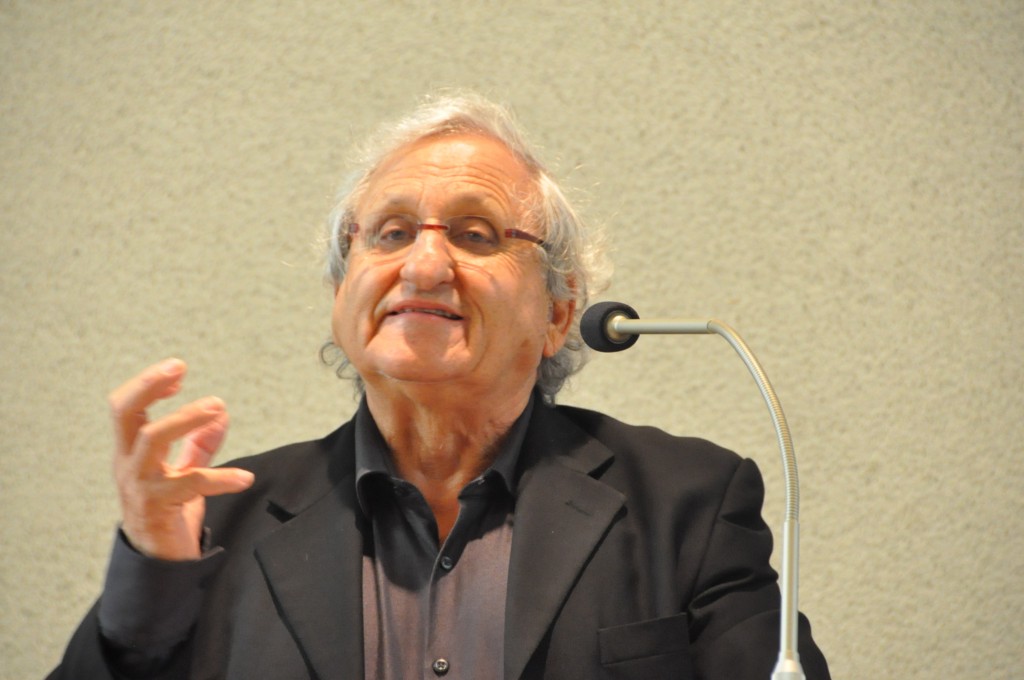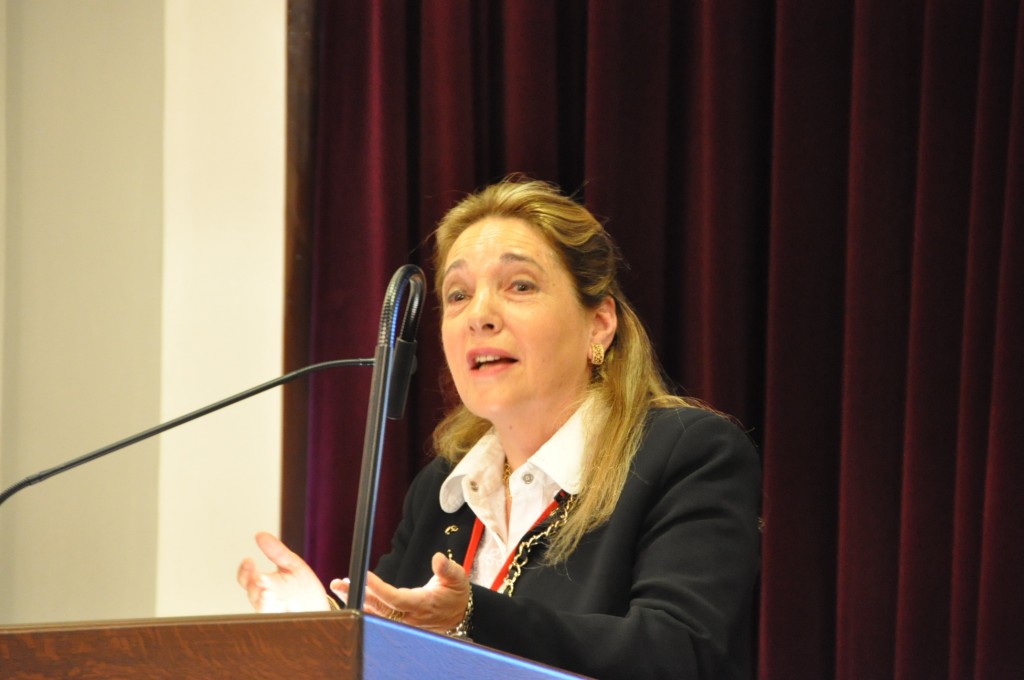Center for Interdisciplinary Study of Monotheistic Religions(CISMOR)Doshisha University
> Public Lectures > The Revival of Hebrew Culture in the Context of Modern Judaism and in Relation to JapanPublic Lectures
The 6th CISMOR Annual Conference on Jewish Studies
The Revival of Hebrew Culture in the Context of Modern Judaism and in Relation to Japan
| Date: |
2012/10/06 13:00-15:00 2012/10/07 13:30-15:30 |
|---|---|
| Place: | Divinity Hall Chapel, Imadegawa Campus, Doshisha University |
| Lecture: |
Abraham B. Yehoshua (Israeli Novelist) Nitza Ben-Dov (Professor, University of Haifa) |
| Summary: | |
|
[10/6 Sat.] Abraham B. Yehoshua (Israeli Novelist) ”Jewish Identity from Myth to History” In his lecture, Abraham B. Yehoshua discussed the issue of Jewish identity from a broad literary perspective. In Israel, discussion has been underway on how to teach the history of Zionism. The Haaretz newspaper once raised the question as to the possibility of conducting historical research without denying the myth that has remained at the basis of the Jewish identity for more than 2,000 years. National identity can be based on either history or myth. Gershom Scholem, a Jewish philosopher, argued that the specificity of Zionism lies in “the return to history.” This remark sounds strange, considering that the Jewish history existed before the rise of Zionism. Yet, we may say that in a sense the identity of the Jewish people can be found only in a myth. According to Roland Barthes, myth is not a direct embodiment of the world itself, but represents the accepted vision of an ideal world. For example, Greek myths are not considered factual but they are understood to have been created to give an account of the events occurring in the human world through the relationships between men and gods. Myths may have some historical facts behind them, or, to the contrary, they may simply be the product of imagination. For this reason, myths can be connected with religions (e.g., the crucifixion of Jesus). Generally, the Jewish people have a greater attachment to religious factors than to racial ones. Through their myth, they have been able to share their identity despite the geographical distance that has divided them. Sometimes, myth can play the role of a super story. In 580 B.C., the First Temple was destroyed by the Babylonians, and in 70 A.D., the Second Temple was destroyed by the Romans. There is a 600-year interval between these two incidents, which took place in entirely different political contexts. In the past, separate rites were held to remember the destruction of each temple, but later, these rites were united as one memorial day. This is one of the examples where two different incidents were combined together based on a common concept—in this case, “destruction”— so that they will be remembered as a myth, not as historical facts. Another example of a historical fact turning into a myth concerns the understanding of Maimonides held by the students of yeshiva, or, Jewish seminary. While these students have good understanding of the writings of Maimonides, they have only poor historical knowledge about the factors that affected the thought of Maimonides (such as Aristotle and Islam). It is the myth that has enabled the Jewish people to maintain their common identity without being affected by the different circumstances in which they have been placed. While they understand themselves as a people brought out of Egypt, it matters little to them whether the Exodus is a historical fact or not. It should also be noted that, while Christianity teaches that salvation will be accomplished anywhere upon the arrival of the Messiah, the Jewish redemption is considered to be consummated in the homeland—the land of Israel. However, the notion of the “homeland” itself has a mythological nature. Rather, the Jewish identity caused seriously negative impacts on the Jewish people. As their identity was grounded in myth, not history or land, the Jewish people were publicly labeled as wanderers on Earth. Accordingly, the existence of the Jewish people itself was made into a myth, which gave rise to very dangerous situations. For example, the mythological nature of the Jewish identity was behind the Nazis’ genocide that killed about one third of the Jewish population. For this very reason, Zionism can be defined as a “return to history.” In the latter half of the lecture, Yehoshua, as a Jewish writer, indicated the difficulty in writing a historical novel on the Jewish people due to limited availability of records. He also mentioned that the purpose of any artistic works, including literature, is to retell history, and that as a writer, he assumes the responsibility to face up to the myths that often draw a veil over historical facts. (Anri Ooiwane, Doctoral Student of the Graduate School of Theology, Doshisha University) [10/7 Sun.] Nitza Ben-Dov (Professor, University of Haifa) ”The Hebrew Culture: A World of Words and Journey” On the second day, Professor Nitza Ben-Dov delivered a lecture in which she argued that the history of the Hebrew language and the Jewish people largely affected the formation of the Hebrew culture and its characteristics. The history of the Hebrew culture is thought to have begun with the verbal instructions given by God, while the Hebrew culture is characterized by the ownership of the language that has belonged to the “wanderers on Earth.” Jewish literature has always been influenced by geographical factors. During the Diaspora, Jews were using local spoken languages, thus giving rise to dialects such as Judeo-Arabic, Ladino, and Yiddish, while Hebrew, as a holy language, was used in literature only. A Jewish historian, Simon Dubnow, introduced a Jewish term “Am Olam” (world/eternal people), which signifies the worldwide presence and eternity of the Jewish people. In medieval Spain, many philosophical and religious books were written in Judeo-Arabic, while poems were written only in Hebrew. Later, the influence of Italy’s Hebrew poems was extended to the philosophy of Enlightenment, and, via the German Enlightenment, it was introduced to Austria and Russia at the end of the 18th century, where Hebrew culture flowered in the early 19th century. The basis of modern Hebrew culture was founded at this time. Benjamin Harshav, a prominent literary critic, argued that the Jewish people have been able to avoid losing their common identity by preserving the “dead language” (Hebrew as a written language). While Diasporic thought is characterized by a lack of attachment to any particular land, country, or language, there have emerged some Jews who developed a longing for worldly culture or a particular country, which eventually led to the revival of the Hebrew language. In modern Hebrew literature, which arose from such a secular motivation, the Hebrew language was restored based on the Talmud, a religious text. In 1853, The Love of Zion by Abraham Mapu was published as the first novel written in Hebrew utilizing biblical Hebrew forms and vocabulary rather than a more contemporary Hebrew. Professor Ben-Dov emphasized the notion of wandering and movement in Jewish life and literature, and gave the example of Shem and Japheth on the Train, a novel authored by Shalom Yakov Abramowitz in 1890. In those days, there was no Hebrew equivalent for the word “train,” and later, “train” was translated as “rakevet” in Hebrew. In this novel, trains symbolize the Jews who were forced out of their hometown. As a new invention, the train was a very attractive means of transport, and could be effectively used to tell the story of a wandering people. Since then, the words “train” and “station” have been frequently used as symbols of encounter, departure, and movement in Jewish literature. These words are also used to indirectly refer to the Holocaust that killed millions of Jews. On the other hand, Abraham B. Yehoshua, who is of a generation younger than Abramowitz, gave a new meaning to “train.” In a sense, his novels represent the Sabra Jews who hold no doubt about the legitimacy of the establishment of the State of Israel in 1948. One of his stories about a night train that passes through an area surrounded by mountains implies the arrival of a new Jewish generation that replaces the conventional image of Jews as wanderers. According to the story of the Tower of Babel, there was only one language on the Earth (Genesis 11:6-8). It is highly likely that this language was Hebrew. If God had not objected to people having one language, then Hebrew could have been the only language available to humans in today’s world. With this remark, Professor Ben-Dov concluded her lecture. (Kotaro Hiraoka, Doctoral Student of the Graduate School of Theology, Doshisha University) |
|
|
The Hebrew Language identified Jews throughout their long history, and was the language that expressed their cultural knowledge, rituals and historical experience through oral exchanges and written texts. During the past 120 years Hebrew reemerged as an everyday language, while maintaining its role as the language of high culture and literature. Hebrew is the vehicle of modern culture for Jews and others in the State of Israel and elsewhere, with deep roots going back through millennia to its biblical times. The aim of this year's conference is to explore the contribution of the Hebrew kanguage as a "secular" language to Hebrew literature, and the connections of Hebrew literature with non-Hebrew literary texts, and in particular Japanese literature, through translation, language study and mutual influence. *********************************************** 10/5(Fri.) Iseaeli Film Night "The Human Resources Manager" (in Hebrew with English subtitles, based on the book by A.B. Yehoshua, 2010 Israel) * Before the showing, Prof. Yoshimi Miyake (Akita Univ.) will give a short lecture. 10/6(Sat.) Public Lecture "Jewish Identity from Myth to History" by Abraham B. Yehoshua (Israeli Novelist) 10/7(Sun.) Public Lecture "The Hebrew Culture: A World of Words and Journeys" by Nitza Ben-Dov (Professor, University of Haifa) *********************************************** *This lecture will be given in English.(Except 5 Oct.) *Admission Free, No Reservation Necessary Hosted by CISMOR & School of Theology, Doshisha University Under the auspice of Embassy of Israel in Japan Organizer: CISMOR |
|
|
10/6 Program 10/7 Program |
|

